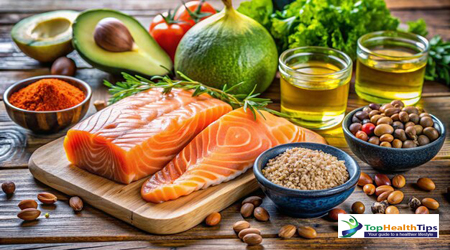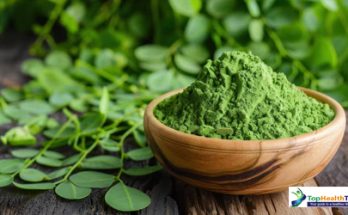Omega-3 fatty acids are essential for maintaining overall health, especially when it comes to heart function, brain performance, and reducing inflammation. Since the human body cannot synthesize these important fatty acids, we must obtain them through diet. Omega-3s come in three main types:
- Eicosapentaenoic acid (EPA)
- Docosahexaenoic acid (DHA)
- Alpha-linolenic acid (ALA)
EPA and DHA are primarily found in marine sources, while ALA is commonly found in plant-based foods. This article outlines the top natural sources of omega-3s, their health benefits, and scientific backing to help you make informed dietary choices.
Health Benefits of Omega-3 Fatty Acids
Scientific research has shown that omega-3s are crucial for various bodily functions:
- Cardiovascular Health: Omega-3s reduce triglycerides, lower blood pressure, and help prevent heart disease by reducing inflammation and plaque buildup in arteries.
- Brain Health: DHA is critical for brain development and function. It is especially important for infants but continues to support brain health in adults, lowering the risk of cognitive decline and neurodegenerative diseases.
- Anti-Inflammatory Properties: Omega-3 fatty acids have been shown to reduce inflammation, which helps in managing autoimmune conditions such as rheumatoid arthritis.
- Eye Health: DHA is a major structural component of the retina, and adequate intake helps protect against age-related macular degeneration.

Top Natural Sources of Omega-3 Fatty Acids
1. Salmon
Salmon, particularly wild-caught, is one of the best sources of EPA and DHA, offering a rich supply of these vital nutrients.
- Omega-3 Content: 1,200–2,500 mg of EPA and DHA per 100 grams (3.5 oz) of wild-caught salmon.
- Other Benefits: High in protein, vitamins B12 and D, and selenium.
Scientific Backing: Studies show that individuals consuming oily fish like salmon have a significantly lower risk of coronary artery disease due to high omega-3 content .
2. Mackerel
Mackerel is another excellent source of omega-3s. This smaller, fatty fish is commonly consumed grilled or smoked and is a staple in many diets worldwide.
- Omega-3 Content: 4,580 mg per 100 grams (3.5 oz) of Atlantic mackerel.
- Other Benefits: High in selenium and vitamin D, promoting immune and bone health.
Scientific Backing: A study revealed that eating mackerel can lower LDL cholesterol, reducing the risk of cardiovascular disease .
3. Chia Seeds
For plant-based omega-3s, chia seeds offer a wealth of ALA. They are easily added to a variety of meals such as smoothies, oatmeal, or yogurt.
- Omega-3 Content: 4,915 mg of ALA per 28 grams (1 ounce).
- Other Benefits: High in fiber, which aids in digestion and blood sugar regulation.
Scientific Backing: Research suggests that chia seeds not only offer omega-3s but also reduce markers of inflammation and improve heart health .

4. Flaxseeds
Ground flaxseeds are another top source of plant-based omega-3s. They are rich in ALA and are best consumed ground for better nutrient absorption.
- Omega-3 Content: 2,350 mg of ALA per tablespoon (7 grams).
- Other Benefits: Flaxseeds are packed with lignans, which are antioxidants that support hormonal balance and may reduce cancer risk.
Scientific Backing: Studies have shown that regular consumption of flaxseeds is linked to a reduced risk of breast cancer due to their high lignan content .
5. Walnuts
Walnuts are a convenient, plant-based way to boost your ALA intake. Just a handful of these nuts can supply a healthy amount of omega-3s.
- Omega-3 Content: 2,570 mg of ALA per ounce (28 grams).
- Other Benefits: Rich in antioxidants and vitamin E, walnuts support brain health and reduce oxidative stress.
Scientific Backing: Research found that adding walnuts to the diet improves endothelial function, crucial for cardiovascular health .
6. Hemp Seeds
Hemp seeds offer a balanced omega-6 to omega-3 ratio, which is ideal for reducing inflammation and promoting overall well-being.
- Omega-3 Content: 6,000 mg of ALA per 28 grams (3 tablespoons).
- Other Benefits: Hemp seeds are also rich in protein and essential minerals like magnesium and zinc.
Scientific Backing: Research shows that a balanced intake of omega-6 and omega-3, as found in hemp seeds, contributes to improved cardiovascular health .
7. Sardines
Sardines are small, oily fish packed with EPA and DHA. They are not only nutrient-dense but also budget-friendly, making them an accessible omega-3 option.
- Omega-3 Content: 2,200 mg per 100 grams (3.5 oz).
- Other Benefits: High in calcium and vitamin B12, sardines support both bone health and nerve function.
Scientific Backing: Consuming sardines regularly has been shown to lower triglyceride levels, thereby improving heart health .
8. Algal Oil
Algal oil, extracted from algae, is a vegan-friendly alternative to fish oil. It provides both EPA and DHA, which makes it a highly efficient supplement for omega-3s.
- Omega-3 Content: 400–500 mg of EPA and DHA per capsule.
- Other Benefits: As a plant-based oil, algal oil is free from the contaminants often found in fish, making it a cleaner source of omega-3.
Scientific Backing: Studies show that algal oil supplements are just as effective as fish oil in boosting omega-3 levels in the body .
9. Krill Oil
Krill oil comes from small crustaceans and offers a highly bioavailable form of EPA and DHA. The unique phospholipid structure of omega-3s in krill oil aids in better absorption.
- Omega-3 Content: 240 mg of EPA and DHA per 1,000 mg of krill oil.
- Other Benefits: Krill oil also contains the antioxidant astaxanthin, which protects cells from oxidative damage.
Scientific Backing: A 2016 study concluded that krill oil is effective in reducing inflammation and improving cardiovascular health .
10. Brussels Sprouts
While not as rich in omega-3s as fish or seeds, Brussels sprouts are one of the few vegetables that contain ALA.
- Omega-3 Content: 135 mg of ALA per cup of cooked Brussels sprouts.
- Other Benefits: Brussels sprouts are high in fiber and vitamins C and K, supporting immune health and bone strength.
Scientific Backing: Research suggests that eating cruciferous vegetables like Brussels sprouts reduces inflammation and supports heart health .
How Much Omega-3 Do You Need?
The recommended daily intake of omega-3s varies based on individual health needs:
- For healthy adults: 500 mg of combined EPA and DHA daily.
- For heart disease patients: 1,000 mg of EPA and DHA per day.
- ALA intake: 1.6 grams per day for men and 1.1 grams for women.
To meet these recommendations, it’s essential to incorporate both marine and plant-based omega-3 sources into your diet regularly.
Omega-3 Supplements: Are They Necessary?
If your diet lacks sufficient omega-3s, supplements can help meet your nutritional needs. Common omega-3 supplements include fish oil, krill oil, and algal oil.
- Fish Oil: Rich in EPA and DHA, fish oil helps lower triglycerides and improve heart health.
- Krill Oil: Provides EPA, DHA, and the antioxidant astaxanthin, offering better absorption than fish oil.
- Algal Oil: A vegan-friendly source of omega-3s, providing EPA and DHA without the need for fish.
Before taking supplements, consult a healthcare professional to determine the right dosage based on your health needs.
Potential Side Effects of Omega-3 Fatty Acids
While omega-3 fatty acids are beneficial for overall health, excessive intake or supplementation can lead to certain side effects. Here’s a list of potential side effects:
- Gastrointestinal Issues: Omega-3 supplements, especially fish oil, can cause symptoms such as nausea, diarrhea, bloating, and indigestion.
- Fishy Aftertaste: Some people report a lingering fishy taste after consuming fish oil supplements, along with fishy burps.
- Bleeding Risk: Omega-3s have blood-thinning properties, which may increase the risk of bleeding, especially when taken in high doses or with anticoagulant medications.
- Low Blood Pressure: High doses of omega-3s can lower blood pressure, which might be problematic for individuals already taking medication to manage hypertension.
- Blood Sugar Levels: In rare cases, omega-3 supplements can cause a slight increase in fasting blood sugar levels, particularly in people with diabetes.
- Allergic Reactions: Some people may experience allergic reactions to fish oil or other sources of omega-3s, particularly if they are allergic to seafood.
- Vitamin A Toxicity: Fish liver oil, such as cod liver oil, contains high levels of vitamin A, which, in excessive amounts, can lead to toxicity and cause liver damage.
- Insomnia: Although rare, some individuals report sleep disturbances, including difficulty falling asleep or vivid dreams, after taking omega-3 supplements.
- Increased Risk of Prostate Cancer: Some studies have suggested a potential link between high levels of omega-3s (especially EPA and DHA) and an increased risk of prostate cancer, though more research is needed to confirm this.
How to Minimize Side Effects
To reduce the likelihood of side effects, consider the following:
- Take omega-3 supplements with meals to avoid stomach discomfort.
- Start with a low dose and gradually increase it.
- Consult a healthcare provider if you’re on blood-thinning medication or have a chronic health condition.
Conclusion:
Omega-3 fatty acids play a crucial role in maintaining your heart, brain, and immune system health. Including both marine and plant-based sources in your daily diet is an effective way to ensure adequate intake. Whether through fatty fish like salmon and sardines or plant sources like chia seeds and walnuts, consuming omega-3-rich foods offers numerous health benefits. Balance your intake of EPA, DHA, and ALA to maintain optimal health.
Related posts for Nutrition and Food >>>
References:
- Calder, P. C. (2020). Omega-3 fatty acids and inflammatory processes: from molecules to man. Biochemical Society Transactions.
- Harris, W. S., & Von Schacky, C. (2020). Omega-3 fatty acids and cardiovascular disease: evidence explained. Circulation.
- Mozaffarian, D., & Wu, J. H. (2011). Omega-3 fatty acids and cardiovascular disease: effects on risk factors, molecular pathways, and clinical events. *Journal of the American College




